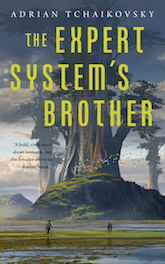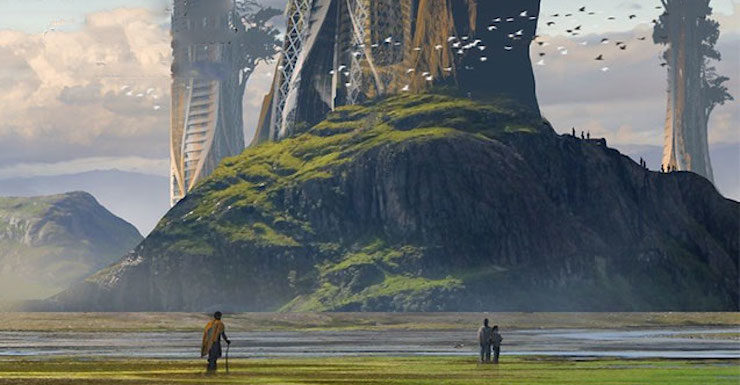The protocols and expectations of reading science fiction and fantasy can differ remarkably for me. In a fantasy novel, I am looking for certain things from the worldbuilding: how the world holds together; the magic system if there is one; the coherence of the world compared to the characters and the plot. Fantasy offers a world that could not be, or could never have been, and I know that going in by the very tag of the genre. Science fiction, on the other hand, presents different issues of worldbuilding: how the world holds together and its coherence, but also seeing how we get to there from here, or could have gotten there from here.
Stories that partake of both genres can either wind up an incoherent tonal mess where the author’s intent is hard to understand, resulting in a “boat car” of a story or novel, or a chance for an author to try to leverage the strengths and expectations of both genres to tell an excellent story, mixing the peanut butter of fantasy with the chocolate of science fiction to create something better than the sum of its parts. This is nothing new in SFF, from Burroughs’ A Princess of Mars through the work of Jack Vance, and on to today. N.K. Jemisin’s recent award-winning Fifth Season series, for example, shows the potential for working in this space.
Buy the Book


The Expert System’s Brother
So we come to The Expert System’s Brother by Adrian Tchaikovsky. The author is well known for providing interesting point of view characters, and has a penchant for featuring extraordinary insects of all sorts in his work. He is also known for writing both straight-up fantasy, such as the Shadows of the Apt series, and science fiction, as in his award-winning Children of Time. Here, both strains of his work get blended together.
Our protagonist in the novella is Handry, a character in what appears to be at first glance a standard fantasy setup. Primitive village, strange customs, a young protagonist, and mention of ghosts set the reader onto the path of thinking that this is a fantasy tale. The protagonist accidentally performs a transgression that ostracizes him from the community, and eventually is exiled from the village of his birth to go on a journey of discovery across a fantastic and unknown landscape. Strange creatures, unusual communities, and more await Handry as he learns about his world. The depth of description and immersion for the reader as Handry’s story unfolds is high. The author brings you effectively and completely into his created world, using the length of a novella to both frame and describe that world without drowning a reader in the extraneous. And yes, there are strange insects involved in this world, because this is, after all, an Adrian Tchaikovsky story.
This fantasy reading of The Expert System’s Brother, however, is muddied from nearly the beginning, with an italicized phrase far more in line with a science fiction tale than a typical fantasy story: “Secondary decontamination onset.” There are more italicized phrases, and more science fictional elements that start to metamorphose the story. Like a larval insect going into a transformative cocoon to emerge into a new life stage as a butterfly, The Expert System’s Brother goes from a fantasy story of discovery and growth into a science fiction tale where as a reader we are trying to figure out where and what the world is, and how things work, and what it all means. What had looked to be magic of some sort is really application of advanced technology, in pure Clarke’s Law fashion.
The presence of technology alone does not make the novella science fiction. It is the science fictional viewpoint that starts to infuse Handry’s story. The three-way contention of ideas between Handry, his sister Melory, and the leader of the exiles, Sharskin, represent three points of view on the relationship that man could and should have with an environment he was not born to, but is now faced with. Do we adapt ourselves fully, as Melory has; reject the world we are faced with, as Sharskin counsels; or do we find a way to compromise, adapt, and belong, even as the world has partially rejected him, as in the case of Handry? This three way cross of points of view is tied to a spectrum of the three key characters’ relationships with science and technology: In the case of Melory, using technology blindly, and in fact being used by it. In the case of Sharskin, attempting to overwhelm it and suborn it to purposes never intended. And in the case of Handry himself, seeking to understand it.
That this is a science fiction story is further highlighted by the idea of the “long genre conversation.” While there are fantasy stories that are reactions and responses to previous novels and stories, there is a greater and more abiding tradition in science fiction for the “genre conversation,” the idea that stories and novels are written in dialogue with each other, and their ideas. For example, James Patrick Kelly’s “Think Like a Dinosaur” is a clear reaction to Tom Godwin’s infamous “The Cold Equations.”
In that tradition, The Expert System’s Brother is for me a reaction and response to stories about colonization of other places, such as the Kim Stanley Robinson novel Aurora. In that novel, which is itself in dialogue with a swath of science fiction regarding colonization of other planets and solar systems, the thesis is that such efforts are doomed to failure. Either planets are invariably hostile in their native life, or other stars have dead worlds that one cannot terraform effectively in a reasonable time frame.
This novella’s contribution to that conversation is that, in order to colonize distant alien planets already full of life, change, severe change, is needed. This puts The Expert System’s Brother into dialogue with novels such as Stephen Baxter’s Flux (where humans are altered to live on a neutron star) and James Blish’s Surface Tension. All of these stories explore the idea that in the end, it is not easy to change people to survive and thrive on alien planets. There are severe costs and consequences to doing so, to the point that those who do so might lose most of their connection to who and what they are. But those costs are absolutely payable, and are worth doing. We are never so much human as we are exploring, heading out there, and changing ourselves and reinventing ourselves to do so.
By building a rich fantastic world—complete with a coming-of-age story—and marrying it to science fictional ideas, genre deepness, and conversation, The Expert System’s Brother serves as further evidence that Tchaikovsky is one of the most interesting and widely writing authors working in genre today.
The Expert System’s Brother is available from Tor.com Publishing.
An ex-pat New Yorker living in Minnesota, Paul Weimer has been reading sci-fi and fantasy for over 30 years. An avid and enthusiastic amateur photographer, blogger and podcaster, Paul primarily contributes to the Skiffy and Fanty Show as blogger and podcaster, and the SFF Audio podcast. If you’ve spent any time reading about SFF online, you’ve probably read one of his blog comments or tweets (he’s @PrinceJvstin).










